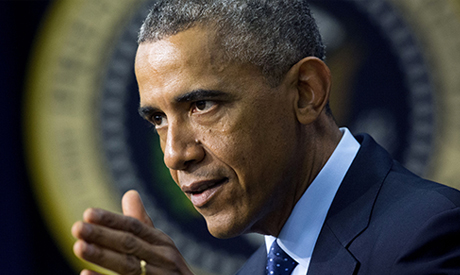
President Barack Obama (Photo: AP)
The Obama administration urged the international community Friday to view outbreaks of Ebola, MERS and other deadly diseases as global security threats that require broad and rapid responses to protect the safety of populations and economies.
Top U.S. officials from the White House, Pentagon and State Department met with representatives from 44 countries and multilateral agencies, including the United Nations and World Bank, to call for implementation of 7-year-old global standards for dealing with deadly epidemics and other health dangers, including biological attacks.
Front and center of the discussion was the worst-ever outbreak of the deadly Ebola virus, which has killed nearly 3,000 people in West Africa over the past six months and could reach a total number of 20,000 cases by November.
"If left unaddressed, Ebola has the potential to cause instability the likes of which we haven't seen since Liberia's civil war," U.S. Secretary of State John Kerry told an audience that included health ministers and other officials from countries with a combined population of 4 billion people.
The meeting came a day after President Barack Obama called on more nations to help fight the Ebola outbreak, saying hundreds of thousands of lives were at stake.
The international community is mobilizing thousands of personnel and pouring billions of dollars into an Americana-led effort to control the Ebola outbreak, which the U.S. Centers for Disease Control and Prevention (CDC) says could infect 550,000 to 1.4 million people by January if nothing is done.
Experts say the world's response to Ebola was months late and it now faces enormous challenges recruiting adequate numbers of volunteers and funding for a long-term initiative that needs to address pervasive economic and cultural issues if it is to contain the disease.
"This is probably the most difficult global health security challenge that we have faced in our lifetime," said Dr. Keiji Fukuda, assistant director-general for health security at the World Health Organization (WHO).
The centerpiece of the global health security initiative is a 2007 set of standards known as the International Health Regulations, which set procedures for responding to pandemics and bioterrorism. But this has been implemented by fewer than 20 percent of WHO's 194 member states.
U.S. officials say the ultimate aim is to equip every country with secure laboratory and health surveillance systems to detect pathogens and emergency operations that can quickly control outbreaks.
"This is a fight that we know how to win. We have the tools and the capacity. All we need is the political will," said Susan Rice, Obama's national security adviser.
Short link: